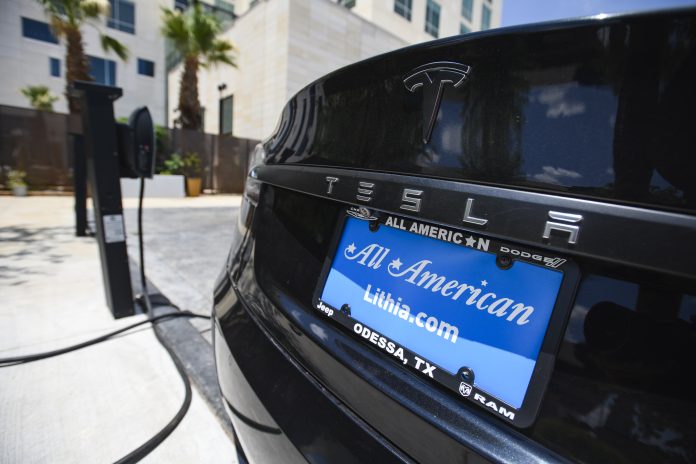Determined to thwart federal regulations that they say would cripple the energy industry, seven oil and natural gas associations in Texas, Louisiana and Oklahoma have appealed to the U.S. Court of Appeals in Washington, D.C., to protect the rights of Americans to choose between electrically powered vehicles and those with gasoline engines.
Filing amicus curiae or “friend of the court” briefs, the groups say the Environmental Protection Agency and National Highway Traffic Safety Administration would be going beyond their congressional authority to force auto manufacturers to alter their fleets away from vehicles powered by internal combustion engines to fleets dominated by EVs.
They say the agencies would also be wrong to mandate their Greenhouse Gas Tailpipe Standards and set vehicle emission control standards under the federal Clean Air Act that are highly favorable to EVs and purposely biased against internal combustion engine vehicles.
“The auto industry has for the most part capitulated to the new regulations and it indicates that it will keep making more and more EV and hybrid vehicles to meet the standards, but the oil and gas industry clearly does not have such an option,” said Texas Independent Producers & Royalty Owners Association President Ed Longanecker from Austin. “The decimation of the market for internal combustion engines would devastate our industry and a substantial portion of the national and state economies and populations that are directly dependent on or strongly affiliated with the oil and gas industry.
“In addition, the hit to various tax bases at the federal, state and local levels would undercut a number of vital public programs including schools and health care.”
TIPRO has been joined in the appeals by the Texas Oil & Gas Association, Louisiana Mid-Continent Oil & Gas Association, Petroleum Alliance of Oklahoma, Texas Association of Manufacturers, Texas Royalty Council and the Austin-based American Royalty Council.
“The amicus briefs detail these inevitable negative impacts and point out that the term ‘zero emission vehicles’ or ZEVs is being used to broadly deceive the public,” Longanecker said. “There is nothing zero emission about these vehicles from a cradle to grave standpoint from the Third World mining of the various key minerals that go into their production through the production process itself and in the generation of electricity that must occur to power a massive U.S. EV fleet.
“Because of the acquiescence of the auto industry to these rule changes, the burden falls to the oil and gas industry to point out the various statutory and constitutional flaws in these new rules.”
In Ohio vs. EPA, Longanecker said, Nashville, Tenn., attorney James K. Vines contends that the State of California should not be allowed to use the California Waiver Reinstatement Rule and the Clean Air Act to mandate ZEVs in the place of gasoline-powered vehicles.
“The Clean Air Act allows other states to follow California’s lead and at this time 17 states and the District of Columbia have adopted California’s EV-ZEV mandates,” Longanecker said. “The result of this rule if it is allowed to go into effect is that it would destroy 40 percent of the national demand for gasoline in the near future.
“This would obviously have a catastrophic impact on the Texas oil and gas industry as well as on the economies and supply chains of all of the oil and gas states and the national economy.”
Citing constitutional grounds and the limited scope of the Clean Air Act, the energy organizations are challenging the EPA’s Greenhouse Gas Tailpipe Standards Rule in Texas vs. EPA and are disputing the NHTSA’s right to impose its Corporate Average Fuel Economy Standards to require that EVs make up 50 percent or more of the new vehicles sold by 2030.
“EPA Administrator Michael Regan actually went further and said his goal is an all-electric vehicle fleet,” Longanecker said. “We’re arguing that these rules should be struck down for a variety of defects under the Clean Air Act, the Energy Policy and Conservation Act and the U.S. Constitution.
“The oil and gas associations’ briefs add the additional and critical argument that the rules fail constitutionally under the Major National Policy Question doctrine. A six-justice majority in the Supreme Court recently struck down a similar EPA rule affecting electric power generation in West Virginia vs. EPA.”
Vines argues that the energy industry “is unquestionably the foundation for the economies of the states reflected by amici.
“The Executive Branch’s effort to drastically reduce or even eliminate internal combustion engine vehicles across the nation and replace them with electric or zero-emission vehicles is a clear and present danger to these states and the nation’s prosperity and survival,” the attorney said. “The consequential massive damage to the Texas, Louisiana and Oklahoma economies and public welfare, along with the negative national ripple effects, clearly encompasses a major question of national policy.
“Because there is absolutely no clear congressional authorization in the Clean Air Act for EPA to take such a sweeping action, the rules fail constitutionally under the Major Question doctrine and should be struck down. EPA, with NHTSA, is attempting to wield an unlawful power to unilaterally phase out the internal combustion engine.
“Congress has never authorized the electric vehicle mandate that the Executive Branch has directed.”




